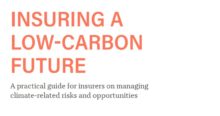Fourteen global insurers worth over USD 3.5 trillion discuss how they manage the risks and opportunities of climate change in a new leading practice guide launched today by climate finance experts. The interviewees provide peers with practical ways to navigate an increasingly complex environment marked by escalating climate risks and regulatory pressure for better disclosure across underwriting and investment portfolios. The report by ShareAction/AODP, called ‘Insuring a low-carbon future: A practical guide for insurers on managing climate-related risks and opportunities’, explores current leading practice, identifies common barriers, and presents a framework of industry-tested building blocks relevant for other insurers of all types. It also offers wider recommendations for policymakers, customers, insurers and their investors to help drive the industry towards aligning with a successful low-carbon and climate-resilient transition.
“The climate crisis requires a more complete, ambitious, collaborative and urgent response from the insurance industry across its risk management, insurance and investment activities. This is why this latest guide from ShareAction/AODP is timely. Critically, this guide highlights how insurers can leverage their climate expertise and networks in driving impactful collaborative initiatives with customers, vulnerable communities and policymakers to help solve the climate crisis now. If successful, the prize of a sustainable future is immense,” said Butch Bacani, who leads UN Environment’s Principles for Sustainable Insurance Initiative (PSI), the largest collaborative initiative between the UN and the global insurance industry.
Supported by over 60 practical examples, the guide reveals how insurers are better managing climate risks by connecting departments and business lines that have often worked separately. Proactive insurers are also found to be developing a new generation of climate-friendly products and services while educating customers and vulnerable communities more widely on climate risk.
The guide also explores how insurers are beginning to integrate forward-looking climate science into risk models that have typically depended on observed data. The recommendations of the Financial Stability Board’s Task Force on Climate-related Financial Disclosures (TCFD) are also found to be supporting and guiding leading climate strategies not only in helping encourage connected thinking on climate issues, but also in driving stronger disclosure on climate risk management by insurers and the companies they insure and invest in.
On the investment side, proactive insurers are strategically increasing their low-carbon investments while engaging more forcefully and creatively with companies on climate issues across both listed equity and debt.
Peter Uhlenbruch, Research and Engagement Manager at ShareAction/AODP and report author, says: “Last year’s IPCC report dropped an eleven-year time bomb for our global society to prevent runaway climate change. In their roles as insurers, risk managers, and stewards of over USD$30 trillion of the world’s assets, the insurance industry has a critical role to play in helping secure an orderly transition to a less than 1.5° pathway. Too few, however, are taking sufficient measures to match the scale of action required. We invite insurers of all types and sizes to use this guide to learn from their proactive peers and embed climate awareness across their whole business. Education, collaboration, and partnership are a key thread running throughout this guide, of which much more will be needed from the industry to stand any chance of weathering the climate crisis.”
Peter Bosshard, Director of the Sunrise Project’s Finance Program, says: “Given their knowledge about the catastrophic risks of a climate collapse, insurance companies need to do more to become corporate climate champions. They should forcefully advocate for climate policies in public, urge the companies they invest in and the trade associations they support to take ambitious climate action, and take the worst climate offenders to court. The examples which ShareAction’s new insurance report presents are welcome but only the first steps for an industry which needs to become a vanguard of climate action.”
Cynthia McHale, Senior Director at Ceres, says: “Clean energy infrastructure projects continue to mature and expand, driving a diversity of investment opportunities. Insurers that increase their clean energy infrastructure investments can promote the resilience of their portfolios, and capture appropriate investment opportunities tied to a global clean energy transition that is irreversible, unstoppable, and crucial to a sustainable future.”
Linda Freiner, Head of Sustainability at Zurich, says: “As a risk expert, we know that climate change is a real and an urgent threat, and we do not want to delay action and leave issues for future generations to solve. That is why already today we help our customers and communities become more resilient to climate risks, and facilitate their transition to a low carbon economy. Still businesses need more of a sense of urgency, and need to act now.”
Alisa Dolgova, Prudential Regulation Manager at the Association of British Insurers, says: “Helpful new report from ShareAction providing a practical guide for insurers on managing climate-related risks and opportunities. Another useful tool for insurers to use as they develop their approach to this fast-moving and important policy area”.
Bronwyn Claire, Senior Programme Manager for Climatewise at the Cambridge Institute for Sustainability Leadership, says: “Following a summer of natural disasters and associated losses from hurricanes, typhoons and wildfires, this industry guide is particularly poignant for the insurance sector. It identifies the positive steps being taken by insurance industry leaders to better manage climate-related risks and opportunities. As well as highlighting the important role of insurers and the feasibility of developing innovative responses that benefit society, the recommendations also illustrate the continuing relevance of the ClimateWise Principles, which have now been fully aligned with the TCFD recommendations and provide an insurance industry standard for climate-related disclosure.”
Stephanie Morton, Climate Finance Lawyer at ClientEarth, says: “The report provides a fascinating insight into how insurers are managing the risks and opportunities of climate change. What emerges is that even proactive insurers are only at the beginning of this journey. The Bank of England has made clear that it expects insurers to develop a strategic approach to climate change, so insurers will need to rapidly evolve their business practices. Failure to do so now carries increasing financial and regulatory risk.”




